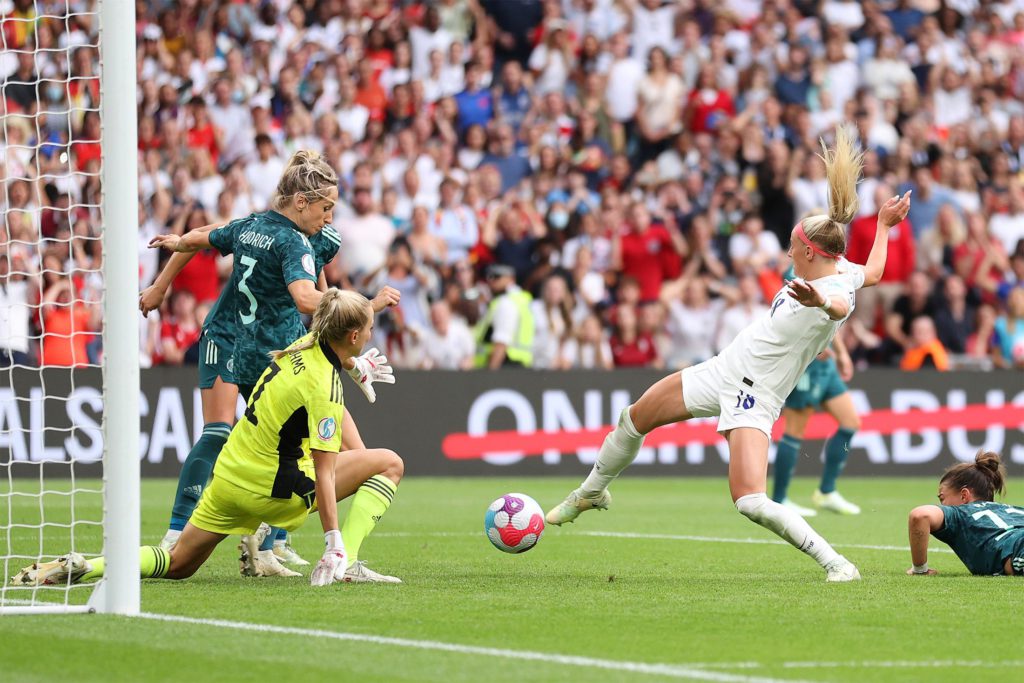(Bloomberg) — England’s 2-1 victory against Germany to win Euro 2022 has become a sponsorship dream. An added bonus for the advertisers is that it hardly cost a thing.
The event set records for attendance and television views, while social media has been flooded with adverts celebrating women’s role in sport. But for all the added spotlight on women’s football, corporate partners would have paid only a fraction of the cost of sponsoring a men’s tournament.
“Many of the sponsors will be laughing right now,” said Maggie Murphy, chief executive officer of Lewes FC, which runs a men’s and women’s team.
Of the 18 major sponsors for Euro 2022, including Lego A/S, Nike Inc., Just Eat Takeaway.com NV and Volkswagen AG, the majority declined to reveal how much they paid to advertise. The rest, along with European football’s governing body UEFA, didn’t respond to requests for comment.
Many sponsors claimed that they would never reveal sensitive information about advertising deals.
On Sunday, 87,192 fans in Wembley Stadium saw England clinch its first major football trophy since 1966. This beat the previous record for a major men’s or women’s Euro final when Spain’s men team played the Soviet Union in Real Madrid’s Santiago Bernabeu in 1964. It was also a new high for a women’s international match in Europe.
Euro 2022 is the largest women’s tournament UEFA has ever hosted. Still, the low sponsorship revenue and lack of lucrative pay-TV broadcasting mean it’s possible the event may actually end up losing money.
“The difference is vast” with men’s football, said Misha Sher, global head of sport, entertainment and culture at MediaCom. “We’ve just seen the most successful women’s Euro tournament of all time and it will be operating at a loss.”
Read More: Euro 2022 smashes the football Records, except for prize money
Sponsoring the men’s FIFA World Cup has long been reported to cost about $100 million for a four-year deal. Euro 2020 booked commercial rights of 520.8 million euros ($535 million), according to UEFA’s annual report.
While the commercial success of the previous women’s European championship in 2017 wasn’t broken out, UEFA said revenue for the event reached just 12.7 million euros.
Conservative Sponsors
“I think many sponsors are traditionally conservative when it comes to sponsoring women’s football,” said Murphy. “They want women’s football to be successful first, and then say they will invest.”
Historically, UEFA bolted on women’s sponsorship as part of larger packages centered around events for male teams, before deciding to unbundle the rights to women’s football in 2018. That year, Visa Inc. became the first ever UEFA sponsor dedicated to women’s football.
It’s still common for sponsorship deals to cover both men’s and women’s teams. Within England’s Women’s Super League, deodorant brand Rexona began sponsoring Manchester City FC three years after sponsoring the men’s. But the support for Euro 2022 may help turn the tide.
“Many WSL teams currently share a number of sponsors with their male counterparts,” said Conrad Wiacek, head of sport analysis at GlobalData. “Brands will now want to associate themselves with women’s sport, given the current excitement and potential audience that could now be watching the WSL, which may mean a windfall of anywhere between $5 million to $10 million per club.”
More stories like this are available on bloomberg.com
©2022 Bloomberg L.P.











